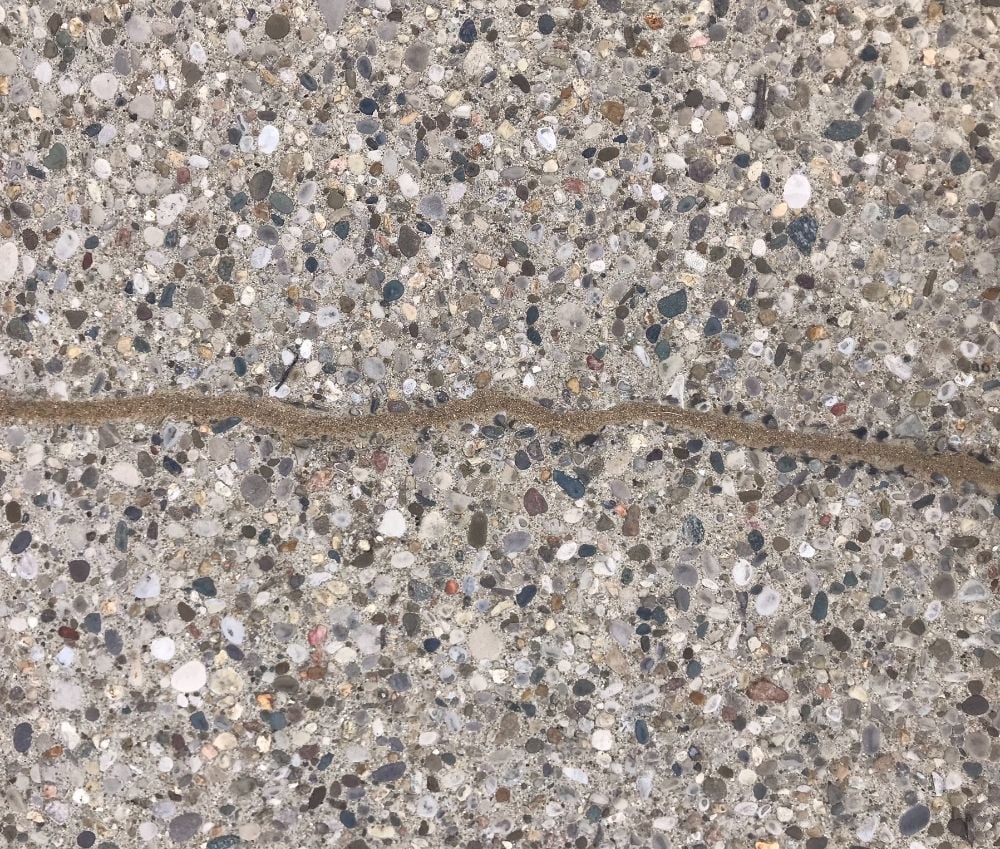Topics:
Search for topics or resources
Enter your search below and hit enter or click the search icon.
Providing your email address will keep you updated should we need to provide updates specific to your location.
August 8th, 2025 | 3 min. read
By Sarah Etler

When cracks or joints in your concrete open up, they allow water in, which can erode the base, cause settling, or make cracks worse during freeze-thaw cycles.
That’s why caulking is more than just a cosmetic touch-up. It’s a first-line defense to keep your concrete stable and looking clean. The question is: should you use self-leveling or non-sag caulk? The right choice depends on the job size, prep time, and control you need.
TL;DR
Flexible concrete caulk is crucial for long-lasting crack repair. Self-leveling caulk is great for wide, flat joints where speed and a smooth finish matter, while non-sag caulk offers better control for small cracks, vertical surfaces, or tricky spots.
In This Article
Concrete expands in summer heat and contracts in winter cold. Ordinary interior caulks aren’t formulated for use on concrete and can’t handle that movement in exterior conditions.
Concrete caulk is a polymer blend designed to grip rough surfaces and stay flexible. That elasticity keeps the seal intact through seasonal changes.
Self-leveling caulk is thin and runny, designed to flow evenly into joints without manual smoothing. It's best for:
Because it’s so fluid, self-leveling caulk will leak through any gaps or voids in the crack. That means you will need to seal or “dam” the joint first to prevent it from running.
Non-sag caulk is thicker, stays where you put it, and won’t run through small gaps. It's best for:
Finishing tip: You’ll need to smooth non-sag caulk manually with a finger, spoon, or trowel using soapy water to prevent sticking.
| Feature | Self-Leveling | Non-Sag |
|---|---|---|
|
Flow & Finish |
Automatically smooth |
Must be tooled by hand |
|
Control |
Harder to control |
More precise |
|
Prep Time |
Sealing/damming required to prevent leaks |
Less prep needed |
|
Best Use |
Large, flat areas |
Small cracks, vertical surfaces |
Pro Tip: We often recommend non-sag for most homeowner jobs because it’s easier to manage and more forgiving if you miss a small gap.
Sometimes, the best approach isn’t choosing one caulk over the other; it’s combining them. Here’s how to do it:
This method gives you the control of non-sag with the clean look of self-leveling, especially useful on long expansion joints or areas with irregular edges where leaks are likely.
If you want a lasting fix without the mess or guesswork, A-1’s local crews can handle the prep, caulking, and cleanup, so your concrete stays protected year-round.
Request an estimate today!
Both can last several years if applied correctly, but durability comes down to prep, product quality, and joint movement, not just caulk type.
Yes, you can use non-sag to dam gaps, then self-leveling to fill the rest for a smooth finish.
Moisture can erode the base, cause slabs to sink, and make cracks worse, especially in freeze-thaw climates.
Sarah Etler joined A-1 Concrete Leveling after receiving her Bachelor of Arts degree in English from Northern Kentucky University. As A-1's Content Marketing Manager, she works closely with industry experts to produce content that will best answer questions related to concrete repair and maintenance practices. Sarah loves living a life full of discovery and is excited every day to see what new things she can learn and share with those around her.
Topics: